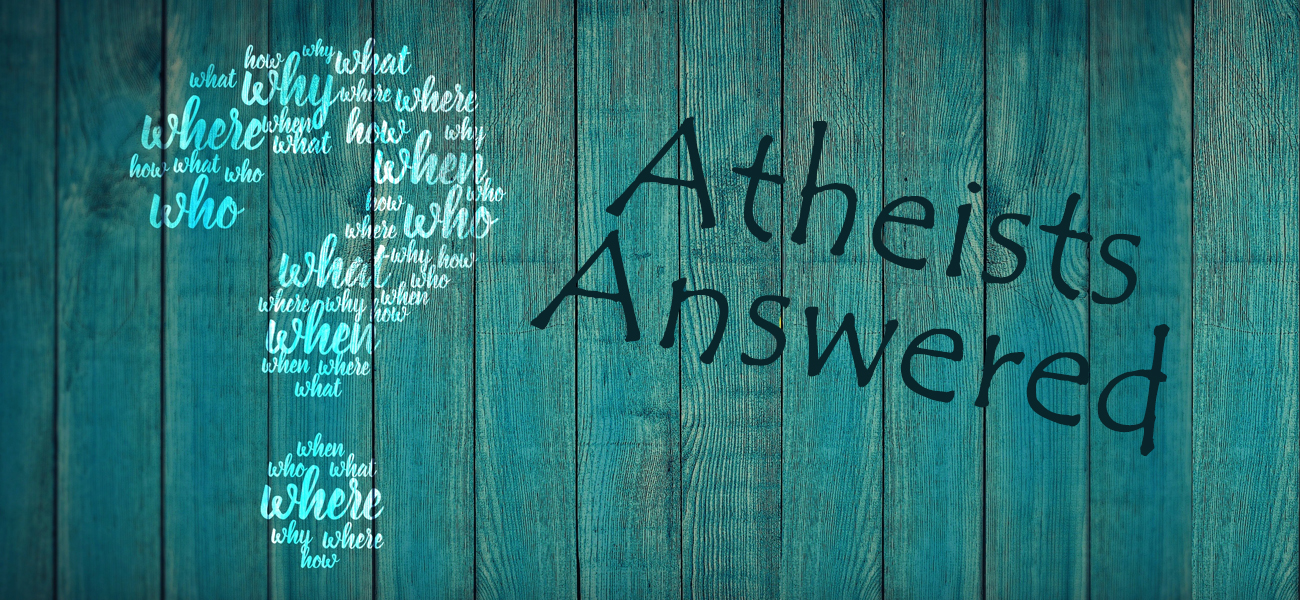Atheist's Attacks
Answering Humanist's Accusations Against the Bible


The Human Basis Of Laws And Ethics
Where Do Humanist Moral Values Come From?
THE HUMANIST OPENING STATEMENT ON THEIR WEB PAGE ABOUT ETHICS STATES: There is a tendency on the part of many theists to assume that the burden of proof is on the nontheist when it comes to the issue of morality. Thus, the individual who operates without a theological base is asked to justify his so doing — the assumption of the theist being that no morality is possible in the absence of some form of “higher” law...
I will try to show the actual source from which values are originally derived, provide a solid foundation for a human-based (humanistic) moral system, and then place the burden on the theist to justify any proposed departure.
"This is one of the greatest fallacies of secular humanism. Its advocates want the benefits of divinely endowed human rights but eliminate the One who endows them. I have never heard an atheist or secular humanist offer a satisfactory answer to the question of where rights originate." - Tal Davis
“In their [humanist] worldview, what makes anything immoral or wrong? Really it boils down to nothing more than their opinion. They believe that something is wrong, and therefore it must be. But who is to say that their opinion is the right one? After all, there are many different opinions on what is right and wrong. Who decides which one is right and which one is wrong?" - Avery Foley and Ken Ham
The following was written in response to an atheist's letter:
"I think I have distilled your long, involved argument down to its essence:
"If an individual thinks something is moral/immoral, that is not objective (that is, it is subjective). However, if a group of people think something is moral/immoral, then it is now an objective moral standard.
"So, let’s test this materialistic basis for moral absolutes with a real world scenario: If one person thinks it is OK to eat other people (e.g. Jeffrey Dahmer), then that is just his subjective opinion. However, if a tribe of people in Papua decide that it is moral to kill and eat other people (as they have done in the past), then the same behaviour is now ‘moral’?
"Hmmm … an objective moral standard?" - Dr Don Batten
The above is an abridged version of the opening statement in the humanist's web article supposedly giving the basis of laws and ethics. I say "supposedly" because the article is mostly an attack on God and Christianity... but on a "god" and "Christianity" of the author's imagination. He has created a god and religion he calls "Christianity" that are so far from truth that they are sickening. Simply stated they are strawmen the author has created, which he then proceeds to knock down. That makes this article a total waste of time.
But, if you'd like to see for yourself, you can read the article at:
https://americanhumanist.org/what-is-humanism/human-basis-laws-ethics/
Basically this article is a propaganda piece, not an informative article. In addition to being completely based on a strawman argument, the major example in the article is a form of red herring. It is the example of a traffic light:
Suppose I am driving in my car and I come to a red light. If I wish to turn right, and it is safe to do so in this situation, then in most states I can proceed without fear of punishment. But what if I do it where it is not legal or safe?
The conclusion is that since humans are able to make laws such as traffic laws, without referring to a higher authority, humans can be the source of moral laws.
What is wrong with this conclusion?
Traffic control is not a moral law, it is a civil law. The Old Testament has many civil laws given by God. These laws were for Israel at the time they were given, in a situation in which Israel was a theocracy. Israel was eventually given a king (human government), and scripture recognizes government (humans) as the source of civil laws. Today we have a government that gives us civil laws that are appropriate for the time we live in.
Is going through a red traffic light morally wrong? Yes. Why? Because it was red? There are lots of red lights, especially at Christmas time. What gives a red traffic light moral authority? A red light has no moral authority on its own. It is the government that gives moral authority to a red traffic light. And the government has the authortity to do this because God has given government the authority to regulate civil matters for the common good.
So, yes, some laws come from humans... but an example of humans creating a civil law is of no significance without understanding that the moral authority to do so comes from God. Humans can even make moral laws. But, every valid moral law has its basis in God's moral law. Humans can even make laws that violate one of God's moral laws, and although that is possible, that does not make that law morally correct.
For a humanist, what is the source of morality?
It is difficult to understand the humanist's source of morality based on the above referenced web page. By this I mean it is difficult to understand their reasons for defining something as either good or evil. The conclusion of article seems to be: people naturally pursue human interests and thus relate laws and institutions to human concerns.
Here are a few other statements from the article that seemed to relate to defining the source of morality:
...human beings are the actual source of values.
Human beings do develop moral and legal systems on their own and later make improvements on them.
...rules are established to maximize mutual satisfaction and to minimize the effects of evil. With rules, we now have right and wrong. And from this basic recognition of the need for cooperation ultimately come laws and ethics.
I find the last one particularly interesting. Notice he says that "rules are established... [by humans] to minimize the effects of evil. With rules we now have right and wrong." Is there anything that bothers you about this statement? The rules minimize the effect of evil. Who defines "evil." These rules he says humans make are how we know right and wrong. So humans design the rules to minimize wrong (that's the definition of evil), and that then defines what is right and wrong. Huh? That's confusing circular reasoning.
The humanist slipped up and allowed that there must be an original source of morality so that "evil" is defined and humanity can then make rules... based on the knowledge of what actions are evil... in order to minimize evil.
Here's another quote from the humanist web site on ethics:
Human beings can find common ground on the issue of moral values without having to appeal to, or even have knowledge of, a divine set of rules.
I find this statement very interesting. Humanity creates rules governing morality because we are able to find common ground on moral issues. How is this accomplished? Do we vote on the rules? Are there any absolute moral rules, established by people, that apply to people everywhere? If not, who are you to tell me I'm wrong?
What about different people groups? The moral rules are very different in the ISIS Caliphate, or even just normal Muslim ruled countries, than they are in America. Who is right? Sharia law or the U.S. Constitution? Is slavery wrong? Is selling very young girls to be the wives of older men wrong? It's not in some parts of Africa.
I like the moral values I've had for the past 20 years... but things are changing in America. Why should I change my moral values? Because you say so?
Let's say I run a business. You say that I must hire certain people. I say that violates my moral principles that are firmly grounded in my humanity, as well as being grounded in the history of human experience. What right do you have to tell me I must change and adopt different moral values?
American humanists, unless you can answer these questions and many other similar questions, all you have is your personal desire to be like god (to be the law maker).
American humanists, all you have done is demonstrate your ignorance of God and what He has said. This is a willful ignorance based on your desire to be like god (to be the rule maker).
American humanists, unless you can clearly define "evil" (or define :"good" and "bad"), and do so in a reasonable, consistent, and non-arbitrary way, all you have is your desire to be like god (your desire to be the rule maker).
American humanists... what's amazing is that you already are made in the image of God, and you reject that truth. The source of morality that you struggle to find is the character of God. And since you are created in the image of God you are a moral being... you are to have the same moral character as God. It is unchanging, the same for all people, and clearly defined.
What did we learn? Humanists cannot explain the source of morality.
The biblical source of morality.
Go back to the list of topics.
GETTING A RIDE
ON THE ROAD TO LIFE

You will exist forever. The question is, where? Disobeying God is the road to death, and we have all disobeyed God:
For all have sinned [disobeyed God] and fall short of the glory of God. - Romans 3:23
The consequence of sin is death. You will exist experiencing death forever.
For the wages of sin is death... - Romans 6:23a
But there is GOOD News! You can have life!
...but the free gift of God is eternal life in Christ Jesus our Lord. - Romans 6:23b
God demonstrates His own love toward us, in that while we were yet sinners, Christ died for us. - Romans 5:8
Instead of our experiencing death forever, Christ died in our place. Repent (turn away from disobeying God), believe this, trusting that Jesus truly did die in your place.
Therefore, having been justified by faith, we have peace with God through our Lord Jesus Christ. - Romans 5:1
